Launching into the Now—Portals of History, Glimpses of the Future
Though the world appears to be opening up with travel and in-person meetings and gatherings, at least in the U.S., I continue here in this space to revisit earlier blog posts like an archeological dig, excavating all the July posts since 2008. Together they compile a sort of dividing line between past—before the global pandemic lockdown—and future—whatever comes next.
I’ve yet to get on an airplane or train where I used to spend considerable time. I’m not reluctant to travel so much as at ease working where I am and have been the last 17 months.
I recently heard a physicist lecture, noting that he has never lived in the past nor in the future, only in the now. The mere fact of his being there makes it the now. So perhaps a historic dividing line is a misnomer as is the concept of annus horribilis. Looking instead at the certainty and continuity of Now, I determine and am determined by my present state of mind.
The July blog posts below peer into the rearview mirror of time and place—locations from Ghana, Turkey (Istanbul and Diyarbakir), China, England, Qatar, Jupiter/Pluto, Israel/Golan Heights, Portugal, Norway, Slovenia, Macedonia and America (Washington, DC)—and reveal the vagaries and hopes of human aspirations, some achieved and others derailed. Readers can click on the date and title to read the full post. In examining the events, I consider the continuity of the places and the resilience of individuals, even when history and homes were ultimately buried under 400 feet of water.
Now is what we have to shape and assist and is the place we live. The fact of getting there is cause for examination and celebration.
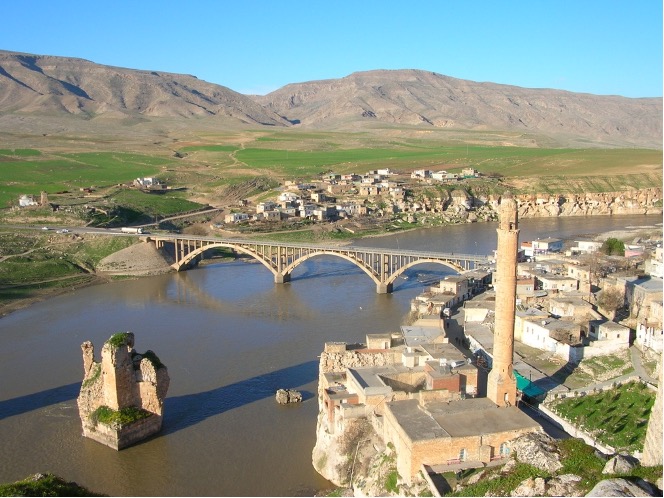
Hasenkeyf, Turkey, March 2005 during PEN Conference on Cultural Diversity, before the Ilisu Dam flooded the region. Photo credit: Joanne Leedom-Ackerman
July 31, 2008: Glass Beads: the Color of Hope, and a Peace Corps on Steroids
This past Sunday in the late summer afternoon with a thunder and lightning storm at two, then blue sky and sun by four, we held a small family barbecue to welcome home from Africa the daughter of a good friend…Our friend’s daughter had brought back a bundle of glass bead jewelry—blue and brown beads, black, red and white beads, etched beads, green and yellow beads, and red, white and blue beads all strung together in an array of bracelets and necklaces—as well as brightly colored children’s clothing, all of which she spread out on the table. She is selling these and will send the proceeds back to the refugees and the surrounding community; she’s also raising funds for at least one high school scholarship for a young man who helped her during her stay at the refugee camp.
There are thousands of stories like these of young people out in the world looking to learn and to give back. I have the privilege of knowing many in the U.S. and abroad whose commitment beyond their national borders suggests a generation that won’t retreat but will connect with the globe. They stay in touch with each other via the internet—even in villages or refugee camps, there is often a way to find an internet connection or at least a cell phone texting connection. These young people don’t hold political office; they don’t have a political agenda—at least not a partisan agenda–they are simply starting to take a share of the world onto their shoulders, one experience, one friendship, one lesson at a time….[cont]
July 28, 2009: On the Tigris: Hasankeyf—Walk into History
In the southeastern corner of Turkey near the Iraq and Syrian borders, where the Tigris River ambles south across the green plains of Anatolia, a major skirmish was won this month by environmentalists and human rights organizations when Swiss, German and Austrian firms pulled out of their contract with the Turkish government to build the Ilisu Dam. The Dam is a cornerstone in a larger project to develop Turkey’s electrical capacity over the next decade.
At the heart of the controversy is Hasankeyf—one of the cradles of civilization—claimed to be the oldest continuous settlement on the globe. Just this month archeologists have found relics they say date the site even earlier than the 10,000-12,000 years recorded; they are now speculating Hasankeyf may be 15,000 years old.
In the Kurdish region of southeastern Anatolia, Hasankeyf and its ruins rise up the limestone cliffs along the Tigris River, where at least nine civilizations have passed through, including the Assyrians, the Romans, the Byzantine empire, the Mongols, and the Ottomans. In ancient Mesopotamia, Hasankeyf was on a central trading route. The area boasts over 4000 caves, which were used as shelter and also as protection from invaders. Some of these caves are still occupied with artisan workshops and restaurants.
As one journeys up the hillside, up the stone steps to the ruins of Hasankeyf Castle, built by the Byzantines in 363AD, the visitor passes the minaret from El-rizk mosque and the circular Zeynelbey Tomb with its blue bricks in geometric designs. One can follow the secret water passageways through the rocks. Visiting Hasankeyf is a journey into antiquity with more than 300 medieval monuments and 83 archeological sites. Today the hillside is also dotted with artisans’ stalls and children on donkeys and restaurants inside the caves. During the controversy over the Ilisu Dam, the mayor in protest chose to live in one of the caves.
If the Ilisu Hydroelectric Dam is constructed as planned fifty miles downstream, much of Hasankeyf will be buried under 400 feet of water. The flooding will also submerge 80 surrounding villages in what would be Turkey’s second largest reservoir. While the government has said that it will move and preserve some of the antiquities, the Hasankeyf residents insist that it is impossible to move caves and many of the ruins. Those from other villages have also protested that the compensation being offered isn’t enough to resettle them….[cont]
July 25, 2010: Blessings and New Birth
This morning my first grandchild was born—a little girl with thick red lips, curious blue eyes, a curly cap of black hair and a surprisingly even temperament that accommodated two sets of grandparents, two uncles and an aunt all hugging, kissing and passing her around within an hour of her appearance in the world.
Everyone in the family is now napping, having had either a sleepless or restless night while the mother (and father) labored towards birth. But I am wide awake and making an effort to record this moment and also to fill this sultry afternoon while I wait to return to see the child. Outside, the temperature swelters above 100, then suddenly the clouds open and rain streams down on the earth. Just as suddenly the sun reappears, still a torch in the sky, but it is cooler now.
While everyone sleeps, I turn to the July blog post I’d intended to write today. I’d been collecting scraps of ideas and clippings for two possible directions for this month’s post, both focused on the wider world. One was to respond to a request for participation in a new project, a blog entitled “Drafting a New Story: Women’s Rights in the Middle East.” Another was a post tentatively titled “Imagining Cuba,” where the promised release of 52 dissidents has stirred some hope for an easing of rights in that country though the releases are conditioned on the prisoners leaving Cuba. Still, the first prisoners, many of whom are writers, have made their way to Spain and to freedom. One recently wrote in The New York Times, “I never imagined I would be born at the age of 60, at an altitude of several thousand feet above the Atlantic. That isn’t gibberish; it’s what I felt when I was released from jail in Cuba and exiled to Spain last Monday.”
The birth of a child brings one’s focus intensely close and personal and at the same time extends it outwards, straining towards the universe and the universal, towards the hope for future generations….[cont]
July 29, 2011: Tourist in Beijing: A Dance with the Censor
We were five PEN members in Beijing, proceeding to Hong Kong where we’d been invited to celebrate Independent Chinese PEN Center’s (ICPC) tenth anniversary. It happened also to be the 90thanniversary of the Communist Party in China as large commemorative plaques proclaimed in Tiananmen Square. And it was the 90th anniversary of PEN International.
We were there to visit writers and bookstores and any independent publishers we could find to gather information on the state of literature and freedom of expression in China and to show solidarity with threatened colleagues. Half the members of the Independent Chinese PEN Center lived in China, half outside. A number of ICPC’s members had been sent to prison for their writing, which the government deemed “subversive to the state.” The writing included articles challenging the demolition of old Beijing, food poisoning scandals and the lighting of 1000 candles commemorating Tiananmen Square. The most prominent of these imprisoned members was ICPC’s former president Liu Xiaobo, 2010 Nobel Laureate for Peace who helped draft Charter ’08 which set out a democratic vision for China.
Our first day—our recovery day—several of us visited the Summer Palace, Tiananmen Square and the Forbidden City as well as a visit to an embassy. In the evening we gathered at a bookstore with writers and journalists where discussion focused on literature and the shrinking landscape for free expression. Micro blogging (like Twitter, though Twitter is blocked) was proliferating, we were told, and often skirted the censors, but censorship of the internet and traditional forms of writing had intensified.
In the days ahead writers, journalists, scholars and officials in embassies, all agreed that the crackdown on freedom of expression in China hadn’t been this grave since the days of Tiananmen Square. The restrictions since February (when the Arab spring began) included arrests of writers and human rights lawyers, torture, increased surveillance, closing down of events at bookstores and monitoring of all communications and movement of suspected dissidents. Many of the so-called dissident writers and human rights lawyers were so closely watched that police literally sat outside their doors….[cont]
July 31, 2012: Pilgrims and the Olympics
On July 31, 1620 the Pilgrims departed from England to America.
A small community of English Protestants, unhappy with the Church of England, had earlier settled in Leiden, Holland hoping to find religious freedom. They found the freedom there, but also found they were kept out of the guilds and given menial jobs. Many of their children became attracted to the secular, more cosmopolitan life so they returned to London, where they got funding through a wealthy merchant and permission from the Virginia Company to establish a “plantation” across the Atlantic between the Chesapeake Bay and the mouth of the Hudson River. The “Separatists,” who called themselves “Saints,” joined up with a larger group they called the “Strangers.” These 102 Saints and Strangers, later known as the Pilgrims, set sail in the middle of summer on two ships headed for the New World.
However, one of the ships began to leak so both ships returned to port. All the passengers and their belongings crammed onto the remaining ship–the Mayflower–and set out again. By then it was the middle of September, the height of storm season on the Atlantic.
After two treacherous months, the Mayflower dropped anchor near the tip of Cape Cod, well north of the goal and a month later sailed across the Massachusetts Bay. By then it was the onset of a brutal New England winter, most of which the Pilgrims spent in harbor on the ship trying to survive. When spring finally arrived, only half of the passengers and half of the crew remained.
Technically, the Pilgrims had no legal right to occupy the land onto which they disembarked, a settlement they named “Plymouth” after the port from which they’d sailed. But they drafted and signed a document they called the Mayflower Compact. They promised to create a “civil Body politick” which would be governed by officials they would elect and ruled by “just and equal laws.” They promised allegiance to the king of England.
On this land they met the native population, one of whom actually spoke English, having been captured by an English sea captain and sold into slavery before he escaped to London. He and others shared supplies and taught the settlers how to survive in their harsh new land. For at least 50 years harmony and friendship existed between the Pilgrims and native Indians. This sharing and friendship is the origin of the American Thanksgiving, which is still celebrated in November each year even if subsequent history proved less admirable.
Today across the Atlantic in England the world is gathering and competing for the next two weeks in friendship in the XXX Olympic Games. Recalling a bit of history mid-summer is perhaps appropriate.
No blog posted July 2013
July 1, 2014: In Qatar, calls for release of prisoners come with the start of Ramadan
(This piece appears on GlobalPost.)
Commentary: The release of one imprisoned poet during Ramadan may seem a small act, but would be a significant humanitarian act toward a more enlightened state.
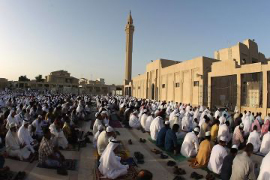
Muslim men perform the Eid Al-Fitr morning prayers outside the Ali Bin Ali mosque in Doha on September 30, 2008. Eid al-Fitr festivities marking the end of the Muslim holy fasting month of Ramadan are celebrated starting today in most of the Middle East countries. (KARIM JAAFAR/AFP/Getty Images)
I am not a Muslim, but I am focused on the arrival of Ramadan this year. The month-long observance began this weekend for 1.6 billion Muslims around the world. A time of fasting, increased prayer and charity, Ramadan is also a time when governments of Islamic countries grant amnesties to citizens and to those in prison.
Ramadan, the ninth month in the Islamic calendar, observes the time when Muhammad, a caravan trader wandering the desert near Mecca contemplating his faith, is said to have been called to receive the word of Allah. The revelation was eventually transcribed as the verses of the Qur’an.
The reconciliation of this holy time with political dispensations varies according to countries and their leaders. My focus is on the country of Qatar and the particular case of a poet in prison. Qatar has been in the news lately as the recipient of the five Guantanamo detainees. This transaction has taken the headlines.
But also in prison in Qatar is poet Mohammed Al Ajami, who has spent more than two years in solitary confinement for two poems. A father of four, Al Ajami is serving a 15-year sentence (reduced from life imprisonment) for poems criticizing the Emir and supporting the Arab Spring. One of the poems was read in a private reading in his apartment in Cairo, but was secretly taped by a fellow poet and uploaded on YouTube. Al Ajami was eventually charged a year and a half later with “encouraging an attempt to overthrow the existing regime….”[cont]
July 15, 2015: EYES ON PLUTO… “WE DID IT!”
Headlines from earth yesterday heralded the Iranian Nuclear Deal, but some of us were looking skyward. On a small green campus tucked into suburban Maryland at the Johns Hopkins University Applied Physics Lab scientists, engineers, media, friends, family, faculty and board of Johns Hopkins University awaited the report back from Pluto. The New Horizons spacecraft, built by Hopkins APL engineers and scientists, had arrived at the outer planet three billion miles away after a nine and a half year journey. That evening the spacecraft was reporting in after 22 hours of silence while it gathered extensive data as it passed within 7750 miles of Pluto.
The spacecraft, which had been built in a record four years at APL, had traveled at a rate of a million miles/day (between 31,000-46,000mph depending on its orbit). The evening before it had started downloading data and taking pictures in a rapid collection of scientific information. It couldn’t do that job and call home at the same time so its progenitors waited anxiously at Mission Control, aware that any number of unpredictable events like a pebble size bit of detritus colliding could disrupt and destroy the mission.
“Stand by for telemetry….” Mission Operations Manager (MOM) Alice Bowman alerted. At 8:52:37pm—right on time—New Horizons called home. “We’re in lock with telemetry with the spacecraft,” she affirmed as one by one the systems managers reported: “MOM, propulsion is nominal…MOM, thermal is nominal…MOM, power is nominal…” Nominal meant normal. MOM meant Alice. The conclusion: “We have a healthy spacecraft and we’re outbound for Pluto!” The room at Mission Control and in the auditorium nearby burst into cheers and tears and gave a standing ovation. It was a remarkable moment and extraordinary achievement.

The mission had proceeded like clockwork. It had been a team effort over a decade and a half, occupying 2500 people. The very best scientists and engineers built the space craft, designed its scientific mission (including the first student-designed project on a NASA mission), programmed its course. The trajectory included an important scientific data-gathering pass of Jupiter, where the spacecraft received a needed gravity assist which sent it hurling on its way into deep space.
New Horizons arrived at the closest approach to the planet just 72 seconds early. That precision over nine years and three billion miles was almost impossible to comprehend except to the scientists and engineers who understood that precision was essential to accomplish the task. Even a small margin of error projected over that amount of time and space could be disastrous….[cont]
No blog posted July 2016
July 24, 2017: Dogs, Cows and Wolves: Security on the Golan Heights
On the Golan Heights in the hills separating Syria and Israel fields of cows graze and sleep, swishing their tails, whisking off flies. Many of the cows lying in the fields appear to be waiting and contemplating as cows do. The cows are a source of milk and of meat and income for a kibbutz nearby. Among the cows wander white dogs. It is a peaceful scene except for the distant thudding and booming of the war in Syria just a mile away.

But at night wolves come out. The dogs and an occasional cowboy are the cows’ main defense. The wolves need to eat too, and a cow just standing there, especially if separated from the herd, is a natural target. The wolves are sleek and fast, and the cowboys respect them.
Sometimes the wolves score, but more often the dogs bark and circle, and the cows bellow. Dogs and cows together hold their own, and the wolves have to look elsewhere for food. Twenty years ago the cowboys determined that if they placed pups in with the cows from birth until they were 10 months old, the dogs would naturally identify with and want to protect the cows. If there are enough dogs, they can dissuade the wolves. The scheme seems to be working, but it is a standoff and not the same as peaceful coexistence.
This drama has played out with theme and variation over the past 50 years since the Golan Heights were occupied by Israel after the Six-Day War in 1967. Israel’s offer to return the Golan in exchange for peace with Syria was rejected then, and Syria attacked in the 1973 Yom Kippur war and was defeated. At present Israel occupies two-thirds of the hills of the Golan which overlooks the Valley and contains the Sea of Galilee and the Jordan River. The Golan includes volcanic fields with dark volcanic rock and lighter limestone rocks. Fruit trees, particularly apples, grow there. The area overlooks Israel which sees the Golan as a natural defense line that secures its border with Syria. Between the two countries lies a small demilitarized zone monitored by the United Nations.
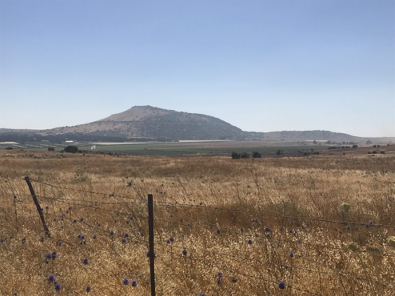
As the Syrian war turns yet another corner with the recent ceasefire, the Russians (and potentially by association Hezbollah and the Iranians) are now sanctioned to patrol and come within a mile of the Israeli border. Tension is again heightening. The border itself is protected by small fences and bunkers, but now on higher alert by the Israeli Army and those in the Reserves who tend the cows and pick the apples in times of peace.
No blog posted July 2018
July 2019: [Beginning in May 2019 I started writing a retrospective of work with PEN International for its Centenary so posts were more frequent in 2019-2020. In July 2019 there are two posts in the PEN Journeys and in July 2020 there are three.]
July 1, 2019: PEN Journey 5: PEN in London, Early 1990’s
PEN International celebrates its Centenary in 2021. I’ve been active in PEN for more than 30 years in various positions and now as an International Vice President Emeritus. With memories stirring and file drawers of documents and correspondence bulging, I am a walking archive and have been asked by PEN International to write down memories. I hope this personal PEN journey might be of interest.
I moved to London where International PEN is headquartered in January 1990 from Los Angeles. I came with my husband and my 9 and 11-year old sons who rarely wore long sleeves, let alone coats or jackets. A few weeks into our resettlement, London spun in its first major tornado of the decade with hail and winds whipping at hurricane force and cars and trees toppled and a few rooftops airborne. The weather was highly unusual for London. Our family, who was still in temporary housing, took the unwelcome weather as a welcome of sorts, signaling that we might just be in for an adventure. Did you see that roof flying…!
There were still complaints: only four television channels, movies strictly restricted by age and when you did get into a theater, you had assigned seats, milk that went bad in a day, delivered on the stoop in glass bottles, a refrigerator that barely held enough food for a day, appliances that came without plugs…And where was the sun?
Yet the magic of the city quickly affected us all. My youngest son discovered the best skateboarders lived in London, and London (and England) was full of history and castles, and my oldest son, who was soon moved ahead a grade in school because he was highly talented in math, met students from all over the world in his class at the American School, a few of whom talked and imagined in his orbit. He was put on the rugby team to help socialize and the following year on the wrestling team, where he eventually, as an adult and by then dual citizen, wrestled for Great Britain in the Olympics.
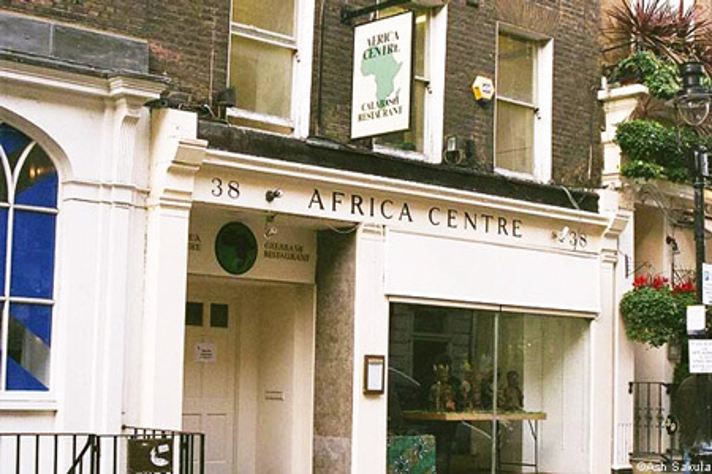
For me, finding home in London meant connecting with PEN, both International PEN and English PEN. Writers can be members of more than one PEN center, though can vote with only one center. I’d begun my PEN journey in Los Angeles at PEN Los Angeles Center (changed to PEN USA West). When my second book was published, I also joined PEN American Center, based in New York, and now in London. I joined English PEN, the oldest and the original PEN center since the organization was founded by British writers in 1921. International PEN and English PEN had separate offices, but the Administrative Secretary of International PEN and the General Secretary of English PEN were longtime friends and actually lived next door to each other in Fulham. The two organizations worked independently, yet closely together.
Early on I visited International PEN’s office, headquartered in Covent Garden on King Street in the Africa Centre. To get to the office at the front of the house, you had to go through the Africa Book Shop on the first floor. PEN had two rooms with several desks in the larger room with papers stacked everywhere. There was a filing cabinet and a photocopier and just enough space to squeeze between to get to the desk looking onto the street….[cont]
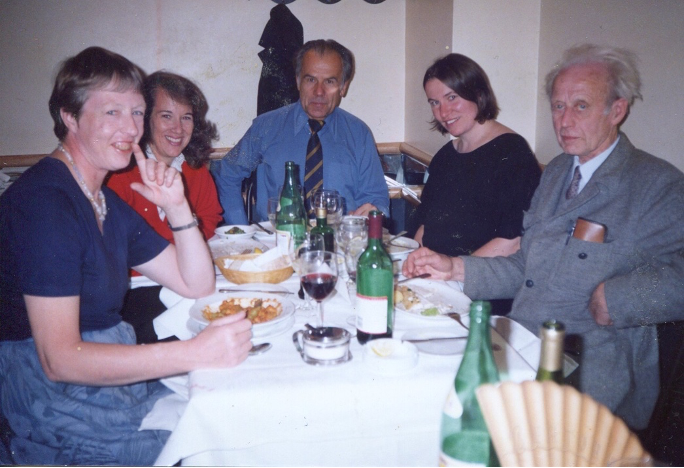
Fall 1990. Left to right: Elizabeth Paterson, Joanne Leedom-Ackerman, Per Wastberg (former PEN International President), Siobhan Dowd, Bill Barazetti
July 15, 2019: PEN Journey 6: Freedom and Beyond…War on the Horizon
PEN members played key roles in the shifting landscape of Europe in the early 1990’s as the Berlin Wall fell, and the East moved closer to the West. Playwright and PEN member Vaclav Havel, who spent multiple stays in prison for his opposition and activism against the Communist regime, was elected President of Czechoslovakia in December, 1989. Czech writers Jiri Stransky and Jiri Grusa, both of whom spent time in jail under the Communists, later worked with Havel. Jiri Stransky became President of Czech PEN, and Jiri Grusa worked in the Ministry of Foreign Affairs and later was elected President of PEN International in 2003. Dissident Hungarian writer Arpad Goncz, whose name was on the program of the 55th PEN Congress as a member of the Hungarian delegation, was prevented from coming because on the day he was to depart, he was elected President of Hungary.
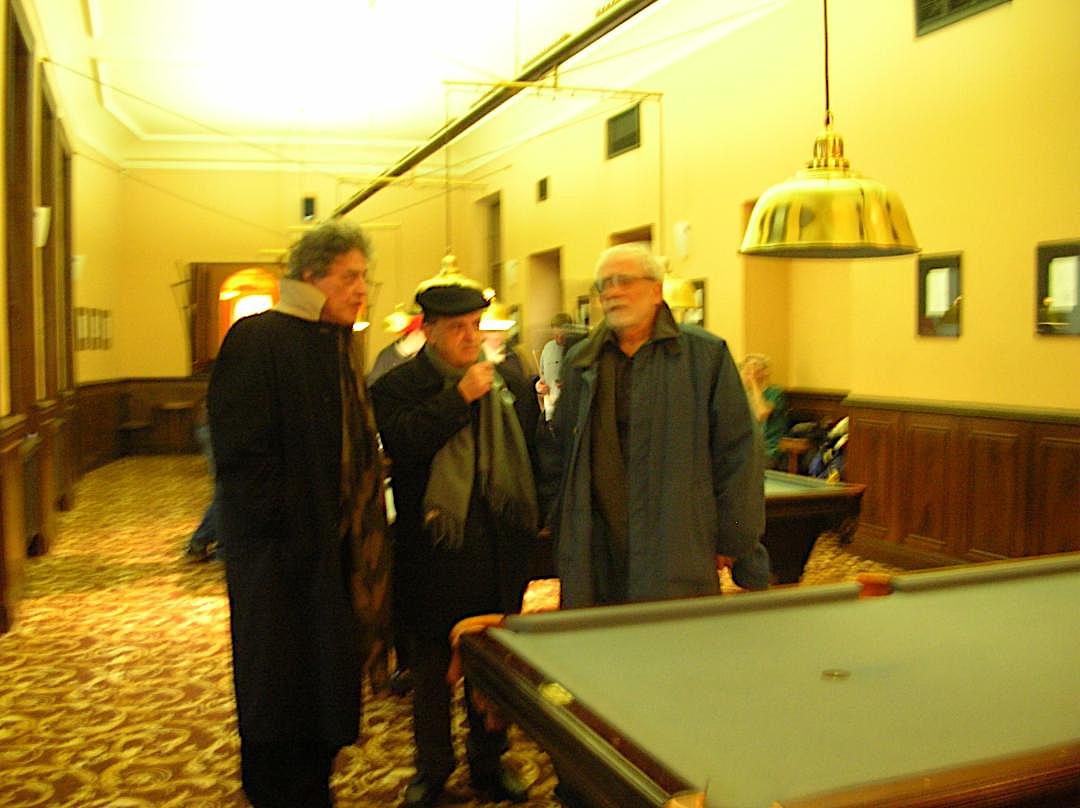
Czech PEN members playwright Tom Stoppard, Jiri Grusa (President of PEN International) and Jiri Stransky (Czech PEN President) at historic restaurant in Prague in 2005
At PEN’s 55th Congress in Madeira, Portugal May,1990, Hungarian novelist Gyorgy Konrad was elected President of International PEN after the unexpected death of President Rene Tavernier. According to the interim and past President Per Wastberg, Konrad had been “very active in the spiritual liberation not only of his own country, Hungary, but of Eastern and Central Europe.”
Konrad told the Assembly of Delegates, “It had been the spirit of human rights, which corresponded with the main interest of the freedom of the mind and of literature, which had been the motive force in recent events in Eastern Europe so that it had been the spirit, rather the physical force, which had caused the shifts in power.” [But] “liberated from the uneasy situation of the censorship of the one-party system, writers there were facing a new sort of danger, the danger of conflicts between nationalities spurred on by national chauvinism. If it was possible to find understanding between writers in that very disturbed part of Europe, maybe it would also be easier to find understanding between the governments and the peoples. Therefore the PEN Centers and their members could perhaps form the avantgarde of this understanding….”[cont]
July 9, 2020: PEN Journey 34: Diyarbakir and Beyond—Finding Byways for Peace
PEN has always been about building bridges, finding the byways of fellowship among writers whose currency is language and imagination and whose hope is that even with radically different histories and backgrounds, writers might find a way to sit down across a table from each other and share stories and listen to each other and thereby have a beneficent influence on the way they and their societies see themselves and others.
It is an idealistic goal that has been battered in PEN’s hundred year history, and yet the organization continues; the dialogues continue, and writers from over 100 countries continue to meet and talk, even from countries whose governments have not found peace in decades. There have been moments of seeing that optimism realized, at least for a time, and also seeing it smashed….
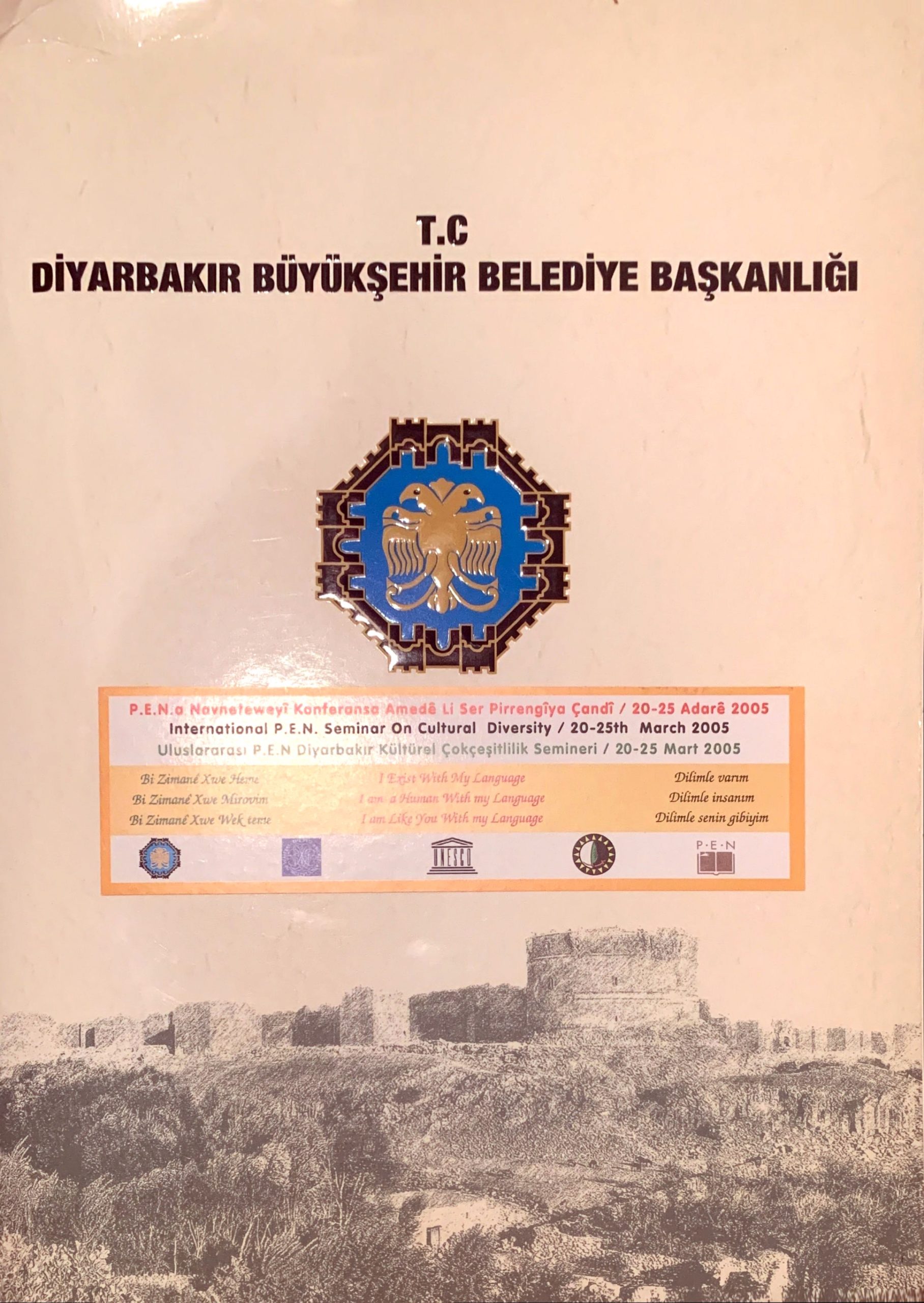
International PEN Seminar on Cultural Diversity in Diyarbakir, Turkey, March 2005
In January, 2005 we held our first board meeting of the year in Vienna where PEN President Jiří Gruša had recently taken up the position as Director of the Diplomatic Academy of Vienna which hosted us. The formal board meeting itself took place in the basement of the hotel restaurant where we were staying. Around the table in the cozy space where we sat on chairs and on a long booth was PEN’s diverse board from Algeria, Colombia, France, USA, Czech Republic, Denmark, Finland, Croatia, Australia, Norway and Japan. The search for an executive director, the new financial and employment systems going into place in the office, an upcoming meeting in Stavanger, Norway with the old Cities of Asylum Network, and an upcoming meeting in Diyarbakir, Turkey with Kurdish and Turkish PEN—all populated the agenda as did the omnipresent discussions on fundraising.
For me, the imminent departure of my Marine son from the combat zone in Iraq hovered in the corner of my mind. We were staying at a pension hotel with small rooms—single bed, dresser and nightstand; I could almost touch the walls on both sides. Outside it was snowing. I’d come to Vienna unprepared for the snow and had bought at a sale a large puffy yellow coat that now draped across the bed for warmth. At night in the dark as I fell asleep, I thought about my son and one night dreamed a desperate dream. Then the phone rang; it was 1:30 in the morning. My husband’s voice woke me. “Wheels are up!” he declared. “They are on their way home!” I still remember the moment, lying there in the dark, snow glistening in the light through the small window and feeling as though the walls had suddenly expanded and a weight lifted that I hadn’t been fully aware I was carrying. The memory…the snow, the Cathedral we passed each day in the square and at dusk in the evening, the puffy yellow coat…
I was wearing that same coat as snow fell later that month in Washington, DC the day my son finally pulled into our driveway. I was sitting on the front porch swing in the snow waiting for him, thinking about the hotel room in the dark, the restaurant basement where we helped craft a conference for writers from the hostile parties in Turkey and another to find sanctuary for writers fleeing oppression—all these memories are wrapped together in a moment of return and of the spirit lifting and life opening a corridor to walk down….[cont]
July 22, 2020: PEN Journey 35: Turkey Again: Global Right to Free Expression
PEN’s work attests to the power of the individual and also to a particular vision of globalization that advocates the global right to free expression, a right that supersedes national restrictions.
In February 2005 Orhan Pamuk, one of Turkey’s most noted writers, received threats and had his books burned by nationalist groups objecting to comments he made to a Swiss magazine while he was abroad. He referred to an Armenian “genocide.” While the Armenian community rallied to defend him, their support heightened certain nationalists’ protest in Turkey. Orhan wasn’t in Turkey at the time and hoped the turmoil would die down, but a government official in southern Turkey ordered the seizing of his books from local libraries so that they could be destroyed; it turned out later that there were none of his books in those libraries.
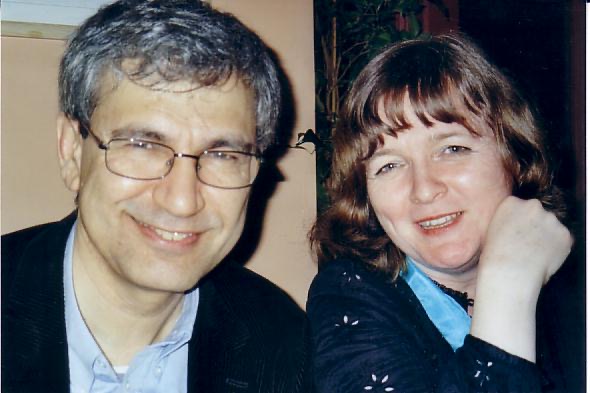
Novelist Orhan Pamuk and Sara Whyatt, International PEN Director of Writers in Prison Committee (Photo credit: Sara Whyatt)
At Pamuk’s request International PEN kept quiet publicly at first. In mid-April Sara Whyatt, International PEN’s Director of the Writers in Prison Committee(WiPC) and I had lunch with Orhan in London to discuss how PEN could help if the threat escalated. I was International Secretary of PEN at the time. We agreed that publicity at this stage could exacerbate the situation; however, we explained that PEN centers could work behind the scenes by direct contacts with their governments, and PEN would be prepared to step into public action should the need arise.
Pamuk intended to stay outside Turkey until late April/early May, but then he would be returning home to Istanbul. Sara stayed in touch with him and shared a plan for action if the threats resumed on his return. Meanwhile we told him PEN would continue to lobby for a change in the Turkish Penal Code that allowed the charges. Key PEN centers, who had good relations with their own governments, and centers from countries with influence in Turkey would make approaches. London’s WiPC would make similar approaches to Turkish officials in Ankara and also through mechanisms at the United Nations, OSCE, and the European Union (EU). At the time Turkey was hoping to become a member of the EU and was attempting to align its judiciary codes with those required by the EU. PEN also worked with the International Publishers Association.
PEN prepared a statement on the situation in Turkey from early 2005 and kept it updated with news and recommended actions for the over dozen PEN centers ready to respond on this case. There was also press guidance should the centers receive queries. Meanwhile PEN continued to work on the other cases of over 70 writers and intellectuals charged or in prison in Turkey, which had long been a country with a revolving door of writers harassed, detained, attacked and sent to prison.
On April 1, 2005 World Peace Day the Turkish press reported:
The investigation against author Orhan Pamuk due to this statement saying, ‘One million Armenians and 30,000 Kurds were killed’ [in Turkey] has ended with a case in which he is accused of violating article 301 of the new Penal Code (same as famous article 159 in the former one) “Insulting Turkish nationality” and with the demand of being imprisoned between six months and three years. The first hearing will take place at Istanbul Sisli No. 2 First Instant Criminal Court on December 16, 2005.
The Public Prosecutor claimed that Pamuk’s remarks in Switzerland’s Das Magazin were an infringement of Article 301/1 of the Turkish Penal Code which states that “the public denigration of Turkish identity” is a crime and that those found guilty should be given sentences ranging from 6-36 months.
With threats renewed by the Public Prosecutor and a lawsuit filed against Pamuk that could result in a three-year prison term, Orhan finally gave PEN the green light to launch its campaign. PEN centers mobilized globally, including in Turkey….[cont]
July 31, 2020: PEN Journey 36: Bled: The Tower of Babel—Part One
In pulling out papers from 2005 of PEN conferences and the 71st World Congress, I came across two documents that told a very human story in PEN and a coincidence of life that I share here:
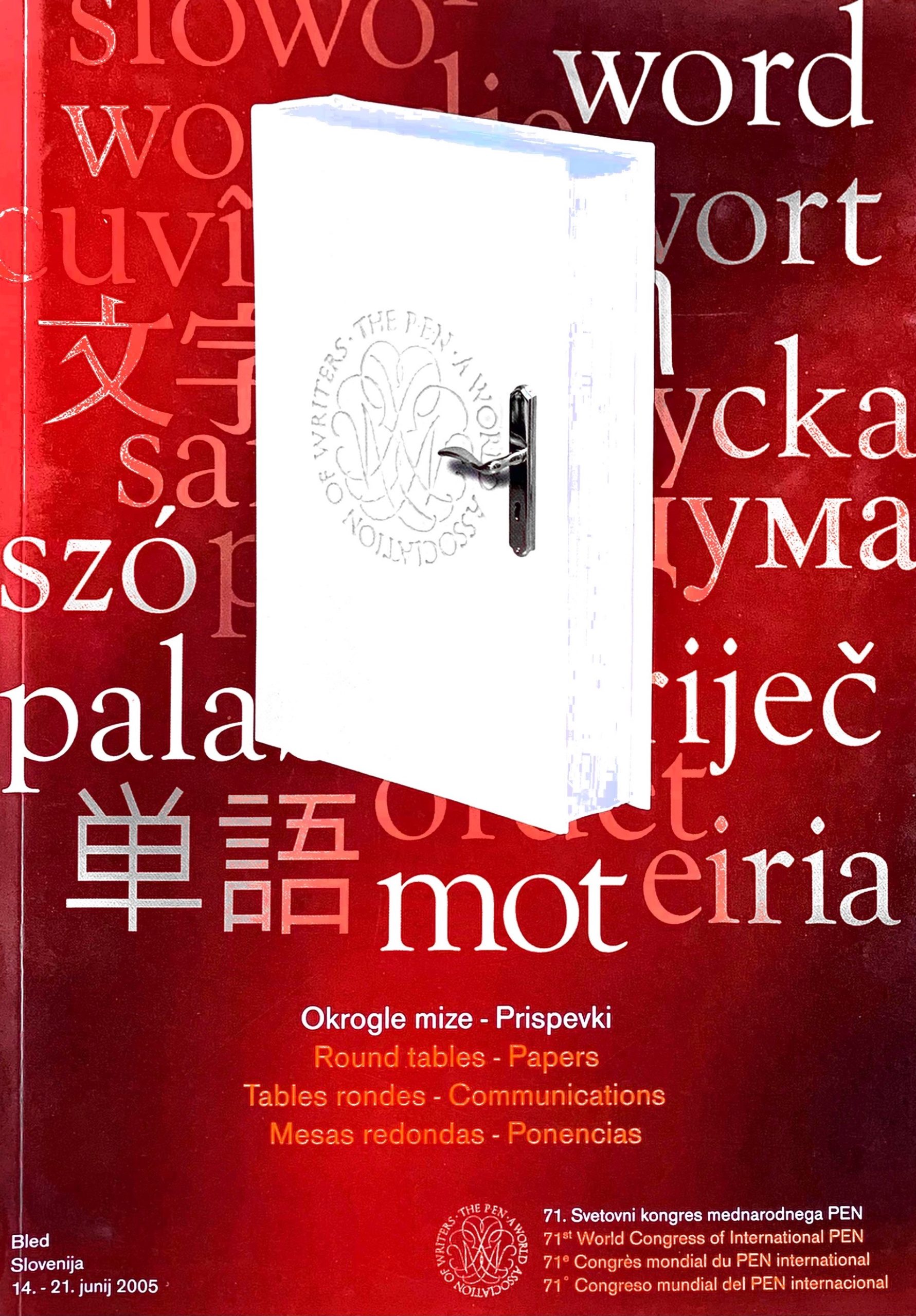
71st PEN World Congress 2005, Bled, Slovenia, Round Table Papers
The first paper I skimmed was a talk I’d given as PEN International Secretary at the Translation and Linguistic Rights Committee Conference in Ohrid, Macedonia in September 2005; the paper included the testimony of a PEN member at the end. The second text I read was from the Round Table Papers of the PEN Congress a few months before, in June 2005. This paper was on the Congress theme Tower of Babel: Blessing or a Curse? The paper was the first in that publication and was written by celebrated Nigerian poet Niyi Osundare who speculated on what the world would be should there be just one language and then meditated on what in fact the world was. Shared below are excerpts from Dr. Osundare’s paper, “The Blight and Blessing of Babel:”
“A one-language world would be too simple, too linguistically neat, too unrealistic. And, I daresay, too unnatural. For everywhere in nature there is a tendency towards fission and mutation on an intra-and inter-generic basis. Variety is not only the sauce of life; it is also its source…
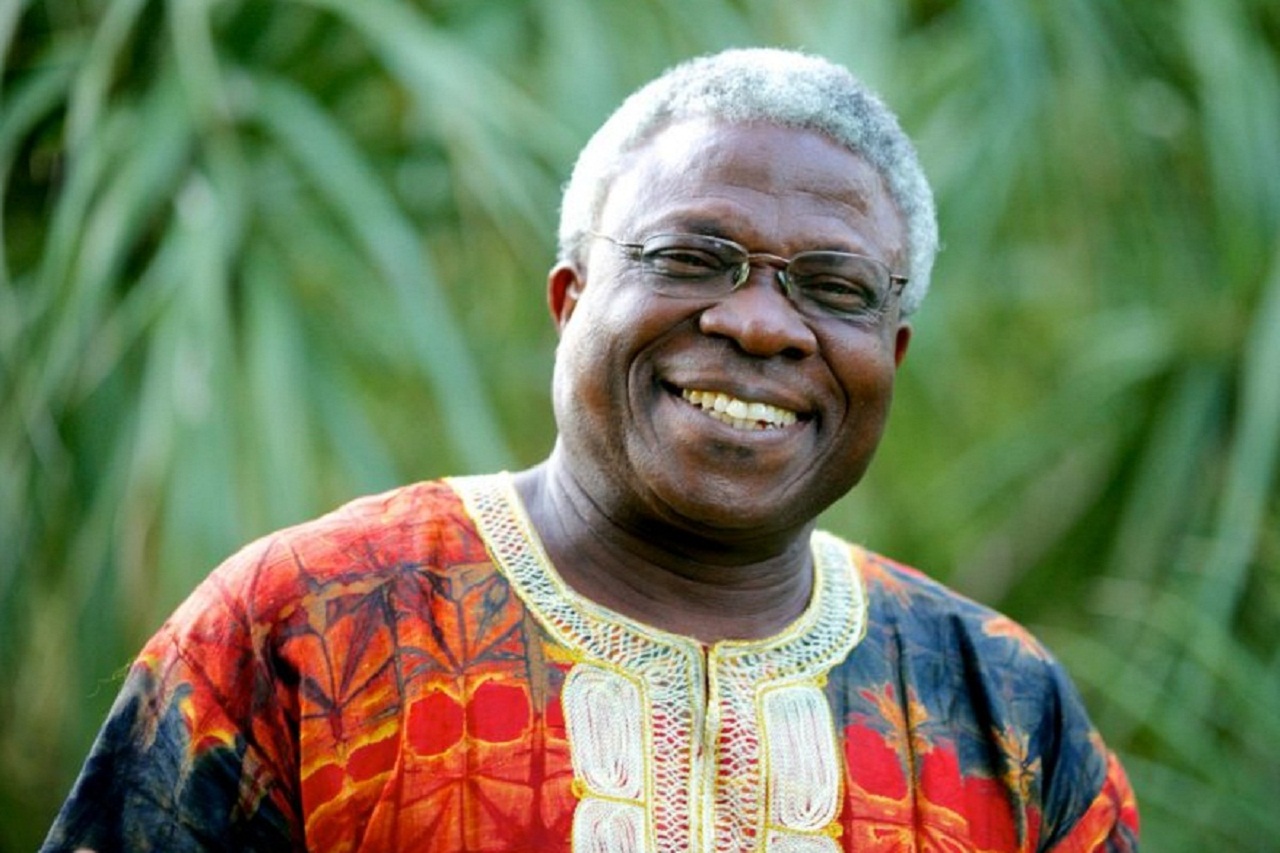
Nigerian poet Dr. Niyi Osundare
“Yoruba culture (the culture in which I was born and raised, and one that I know best) understands the necessity of diversity and inevitability of varieties in different aspects of human life. Hence the saying “Mee l’Oluwa wi” (Many, says the Lord) and “Ona kan o w’oja” (There are countless routes to the same market), both of them short, handy variations on a longer proverb “Oju orun t/egberun eye fo lai farakanra (The sky is wide enough for a thousand birds to fly without colliding). Corroborating this pluralist perspective is the folktale about the Tortoise, ever cunning and self-centered, who one day decided to capture all the wisdom in the world and seal it up in one pot for his own use in an effort to become the wisest being in the world. Of course, his project ended up in a laughable disaster as his pot fell to the ground and exploded while different fragments of the imprisoned wisdom dispersed in different directions, free for all, unmonopolisable. In an essentially pluralist Yoruba worldview, phenomena exist by mutual definition; a thing, a person loses its sense of proportion when there is nothing else to compare it with. The trajectory of life hardly ever follows one straight and narrow path; it must confront the crossroads, experience the thrills and tortures of decision and indecision, before arriving at the juncture of choice. And for the act of choosing to take place, there must be more than one…
“Literature (and the arts generally) is, no doubt, a powerful weapon in the struggle against the blight of Babel. By endowing our airy thought with that ‘little habitation’ and ‘name’ (hail Shakespeare, one of the supreme healers of the wounds of Babel), by generating universal sympathies, globalizing the particular and particularizing the global, by producing that music of the spheres whose winds stir the eaves in different lands, by evoking images which touch hearts across cultures, by articulating those humane values that are essential to human freedom everywhere in the world, by constantly lifting the human spirit and enriching, interrogating human reality with the supple possibilities of fiction…literature strives to restore some of the lost potentialities of Babel. For every significant writer is a bridge-builder of a kind, a witness, a participant-observer, an advocate of a truly humane future.
“No doubt, the phenomenon of Babel has left its fragmentations and dispersals. But it has also bequeathed to humanity a panoply of sounds and letters, an astounding (even if confounding) array of tongues which challenges the tyranny of uniformity and monotony of methods. It has necessitated the building of bridges across diverse tongues and cultures, these bridges being, in a way, a horizontal alternative and antidote to the vertical impossibility of the Tower itself.”
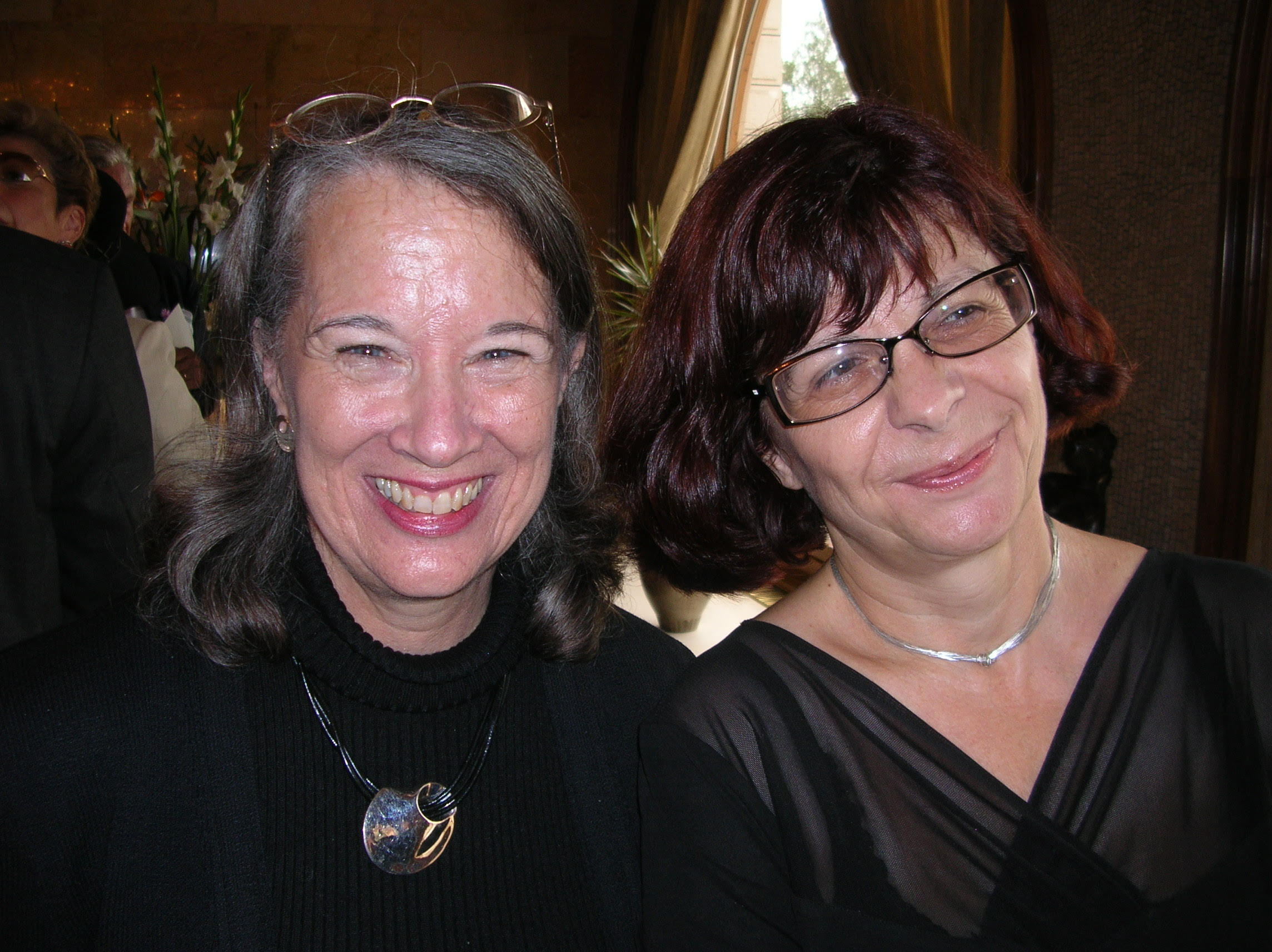
L to R: Joanne Leedom-Ackerman (PEN International Secretary) and Kata Kulavkova (Chair PEN Translation and Linguistic Rights Committee)
Dr. Niyi Osundare, a Nigerian PEN member, had moved to New Orleans for specialized education for one of his daughters and was also a member of the African Writers Abroad PEN Center. Recounted here is my talk to the Translation and Linguistic Rights Committee a few months after the Bled Congress, in September 2005. Only as I recently read the end of my paper did I grasp the connections and the range of PEN’s reach and work. My observations at the time:
The theme of the 8th Ohrid P.E.N. Conference—Writer Within and Without a Homeland—struck a particularly sonorous chord as I was preparing to come here.
In the U.S. the question of homeland has been on the national consciousness for the past month as one of America’s most diverse and multi-lingual cities—New Orleans—has literally disappeared. Its population evacuated as the city sank into the waters of the Gulf of Mexico. A large portion of the Gulf coast also fled in the face of Hurricane Katrina. Over a million people dispersed throughout the land in one of the largest displacements in the nation’s history. Many will never return to their homes….
When a home is suddenly gone, family scattered, livelihood and career and ambitions all uprooted, one is forced to consider what endures, and what one can take with him. Home moves from a physical place to a place in consciousness.
The ability to speak with others and to tell the story is especially important and makes the idea of language as homeland compelling, also imagination as homeland, literature and art as homeland, and particularly relevant to PEN, a community of fellowship as homeland.
I’d like to read a message to PEN’s Africa Writers Abroad Centre from a Nigerian writer trapped in New Orleans:
This is my first real internet access since the disaster struck…I can’t thank you enough for your concern and care. It’s been all so overwhelming. My wife and I are alive and, after passing through five horrendous “evacuation centers”, have been allocated to the Red Cross shelter in Birmingham, Alabama. The nightmare of the past seven days is simply unimaginable. We very narrowly escaped drowning in our own house. Pursued by an 8-foot high toxic flood water (15 feet in the street outside our door), we were forced up a stuffy, airless attic, where we were holed up for 26 hours, with no food, no water, no prospect of any rescue. We were only saved by the fortuitous intervention of a neighbor who heard our shout for help when he came round with his rescue boat to pick up something from his own house. With life vests provided by him, we managed to swim out of our house, leaving everything we had behind. Right now, all our clothes, books, academic and professional credentials, travel documents, computers, manuscripts, etc are submerged in the dirty waters of the New Orleans flood. Hell has no other name… We deeply appreciate your concern. Kindly pass on our gratitude to all on your list serve.
Yours in the Eye of the Storm
[Niyi Osundare]
I’m told he has been overwhelmed by the outpouring of concern. While the concern and offers of assistance can’t replace what was lost, it can fill in some of the spaces in the heart….[cont]
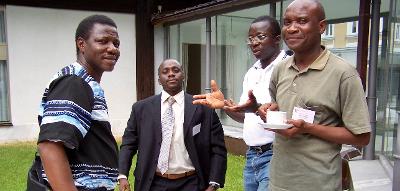
Delegates at PEN International World Congress, Bled, Slovenia, June, 2005. L to R: Remi Raj (PEN Nigeria), Dan Kayhana (PEN Uganda), Frankie Asare Donkoh (PEN Ghana), Alfred Msadala (PEN Malawi)
WOW
thanks
Thank you for reading!
It has to be enough for me to say Thank You. The scope of your writing is always humbling to me. At the same time I do enjoy a shared depth of thought with you…still, your writing about our world opens my mind and my heart! Our friendship near and far, over the years has been a constant inspiration to me. I write today with memories kept in companionship –as impetus to my better actions. Joanne, you Rock!
Thank you, Marilyn. And wishes for your vibrant Now!